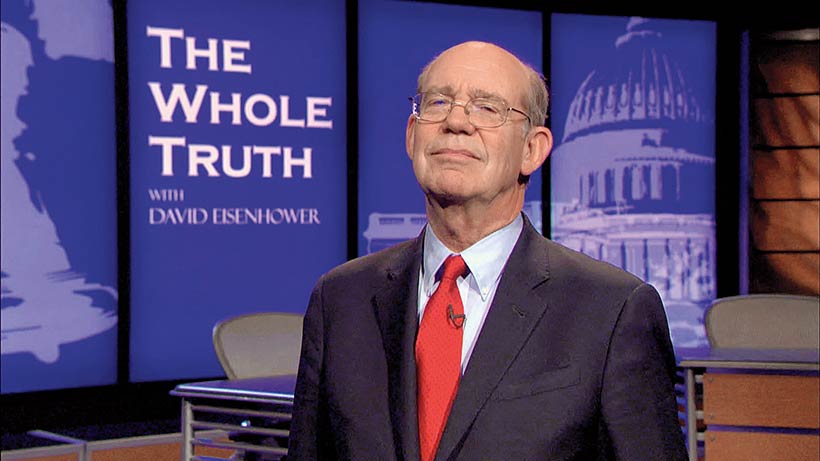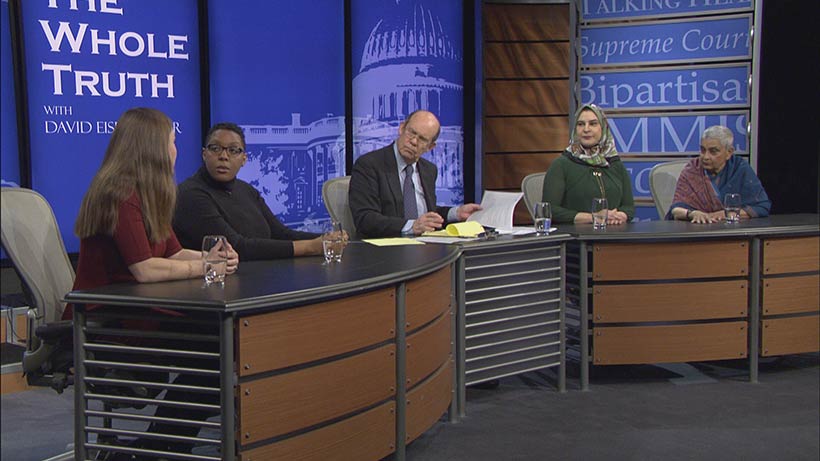TV Review: The Whole Truth

We live in a hyperpartisan era. Hunkered down in online echo chambers, we’re polarized not only in our politics, but in the news we consume; at times factuality itself seems to have evaporated, leaving only powerful fictions battling for supremacy in the public square. What about fairness and objectivity? The words evoke a midcentury moment when widespread trust in U.S. institutions and leaders fostered the belief that issues could be engaged in the hope of arriving at solutions, even at truth. That hope seems quaint now.
Enter David Eisenhower ’70. Director of the Institute for Public Service at the Annenberg School for Communication, he moderates The Whole Truth, a political talk show that premiered last fall on PBS. The show aims to restore nonpartisan debate; its goal, says Eisenhower, is “to extract stipulations and elicit opinions and judgments that actually move the ball in public dialogue”—and to do so “with decorum.”
If watching someone extract stipulations does not sound like must-see TV, don’t worry: there are lively discussions aplenty, with guests ranging from former Sen. Tom Daschle, to Harvard Professor Lawrence Lessig, to Gen. Wesley Clark. Viewers tired of the usual toxic shoutfest will find The Whole Truth a soothing antidote. Eisenhower’s manner helps. Polite and mild, he is an avatar of his grandfather’s comforting establishmentarianism. He even looks like Ike.
The Whole Truth takes on big issues. Is the political system broken? Are our news media serving democracy, or damaging it? What is the proper purpose of the U.S. military? As seminar leader, Eisenhower makes frequent recourse to history, helping us see beyond the end of our own collective nose. In one segment, he reminds us of the election of 1800, “one of the dirtiest in American history”; when the topic of Hillary Clinton and the “women’s vote” arises, he invokes 1960 and the Catholic vote.

Panels are constructed with a painstaking effort at balance. Thus an episode on income inequality includes both a writer for The Nation and a fellow from the Cato Institute. But don’t expect fireworks. The show has a transmogrifying effect on hardened combatants, presenting a docile Greta Van Susteren and a Chris Matthews who speaks quietly and waits for others to finish making their points.
Eisenhower is more at home with some subjects than others. A natural when it comes to global geopolitics, he exits his comfort zone in a discussion of global feminism (he smiles gamely as a panelist brings him up to speed on how “the goal of the patriarchy is to have one minority group attack another.”) At times his sublime squareness cues a comical anachronism, as when he discusses Jimmy Fallon slow-jamming the news with Barack Obama. But his guests frequently serve up cerebral, witty commentary: former U.S. Rep. Tom Davis ’71 (R-Va.), studying a map of a bizarrely gerrymandered Illinois district, quips, “Picasso could get his artistic fulfillment from drawing these districts, and he wouldn’t even have to go through his Blue Period.”
A second season of The Whole Truth begins airing in May, and some kinks remain. The show is awkwardly edited in places. And its determined fairness sometimes comes at a cost. One segment notes that last year’s presidential election sparked “widespread
concern about incivility,” yet no one mentions the (GOP) elephant in the room—a president whose campaign was based on incivility.
Eisenhower wants us to stop scoring points and start fostering understanding instead. “America must see itself clearly, rather than through any political narrative of the right or left,” he says in one closing homily. “Each of us has a responsibility to listen and learn from those with whom we disagree.”
That’s no easy sell. Two centuries ago Tocqueville observed that “an American does not know how to converse. ... He does not talk, but holds forth.” Making things worse is the sanguinary gladiatorial style of today’s political
discourse. Eisenhower dislikes it, and in The Whole Truth he pushes back with the decorous centrism that is the legacy of his name.
Rand Richards Cooper ’80 is contributing editor at Commonweal Magazine.